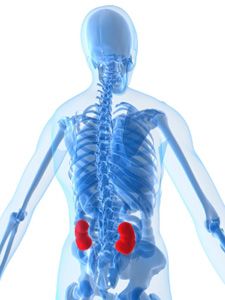 A kidney disorder characterized by blood in the urine; caused by inflammation of the internal kidney structures and deposits of IgAantibodies in the kidney mesangial tissue. (Alternative names: Nephropathy - IgA; Berger's disease)
A kidney disorder characterized by blood in the urine; caused by inflammation of the internal kidney structures and deposits of IgAantibodies in the kidney mesangial tissue. (Alternative names: Nephropathy - IgA; Berger's disease)
Causes, incidence, and risk factors
Berger's disease is a form of mesangial proliferative nephritis. Inflammation of the renal glomeruli occurs, and there are IgA (a type of antibody) deposits in the kidney. The disorder can appear as acute, rapidly progressive, or chronic glomerulonephritis; or as visible or microscopic hematuria (blood in the urine).
Berger's disease usually is discovered after one or more episodes of dark or bloody urine in a person with no other symptoms of kidney disorder. Bloody urine may begin during or soon after a respiratory infection. Acute nephritic syndrome or nephrotic syndrome (groups of symptoms associated with decreased kidney functioning) may result.
Risk factors include having a personal or family history of IgA nephropathy or Henoch Schonlein purpura (a form of vasculitis that affects many parts of the body, and may cause a kidney lesion that is identical to the lesion of Berger's disease). Berger's disease can occur in persons of all ages, but most often affects males in their teens to late 30s.
Symptoms: changes in color of urine:
- bloody
- urine dark, brown, or rust colored
- repeated episodes of dark or bloody urine
Signs and tests
There are no specific changes on physical examination. Occasionally, blood pressure may be elevated or swelling (edema) of the body may be present.
- Urinalysis shows blood and red cell casts in the urine, and may also show protein and fats.
- Kidney biopsy shows deposits of IgAantibodies and confirms the diagnosis.
- Immunoelectrophoresis - urine shows antibodies to IgA
Treatment
The goal of treatment is to relieve symptoms and prevent or delay of chronic renal failure. Antihypertensive medications and diuretics may be given to control high blood pressure and edema. Control of blood pressure is the most important measure to delay renal damage. Sodium (salt) and fluids may be restricted to control swelling. Low to moderate protein diet may be recommended in some cases.
Prognosis
IgA nephropathy progresses slowly. In many cases, it does not progress at all. High blood pressure, large quantities of protein in the urine, and increased creatinine levels (blood tests that reflect kidney functioning) indicate a higher risk for progression of the disorder. About 25% of people with IgA nephropathy develop end-stage renal failure within about 25 years.
Complications: chronic renal failure, end-stage renal disease
Copyright: Andrew Koren, M.D., Department of Nephrology, NYU-Mount Sinai Medical Center, New York, NY. Review provided by VeriMed Healthcare Network.
Action of TensioReg 200mg
The combined action of TensioReg and DynOrgan
A depurative cure will always constitute an excellent basis to ensure the efficiency of almost any other targeted approach. DynOrgan is a depurative that cleans vital organs and ensures the proper functioning and the stimulation of those organs (namely: the liver, spleen, pancreas, kidneys and gall-bladder) with the following objectives:
- Ensure efficient elimination of toxins
- Dissolve and eliminate gallstones and kidney stones
- Improve the overall metabolism and general condition of vital organs
DynOrgan is therefore an excellent stimulant of the kidney functions and its combination with TensioReg that controls the blood pressure has shown to be effective for Berger's Disease (glomerular nephritis – the presence of blood in urine).
It is advised to start off with a regular 10 days cleansing cure (6 capsules per day – 2 capsules after each meal) while taking one capsule of TensioReg per day (100mg or 200mg depending on the necessity to combine with other blood pressure products). After the initial 10 days cure, continue taking 2 DynOrgan capsules, along with one TensioReg capsule per day for two months.
At first, the presence of blood in the urine will slightly increase, it is the DynOrgan depurative effect, which eliminates some of the blood deposit accumulated in the kidneys. After a two months, it is recommended to get a urine analysis in order to compare the results, the blood level should be much lower.
Following the initial two months cure, it is advisable to take one capsule of TensioReg and DynOrgan per day in order to maintain proper kidney functions and to control the level of blood in the urine.




